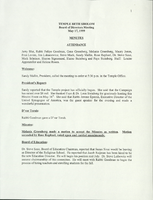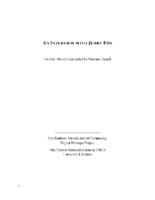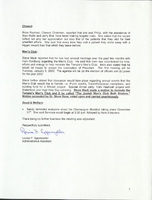Search the Special Collections and Archives Portal
Search Results

Transcript of interview with Priscilla Schwartz by Barbara Tabach, June 16, 2016
Date
Archival Collection
Description
In this interview, Schwartz talks at length about her passion for compassionate hospice care, and her broad involvement with the Nathan Adelson Hospice, from volunteering to serving on the board to philanthropy, which included opening the Walter Schwartz Center for Compassionate Care. Schwartz also talks about other philanthropic giving which includes establishing scholarships at George Washington University and University of Michigan as well as support to Temple Beth Sholom gift shop.
Text

Transcript of roundtable interview with members of Midbar Kodesh, April 19, 2015
Date
Archival Collection
Description
In this interview, members of Midbar Kodesh discuss how they each became involved in the synagogue, and how the congregation formed in the mid-1990s. Some of the narrators grew up in Las Vegas and talk about the growth of the town and being former members of Temple Beth Sholom.
Text

Transcript of interview with Greg Goussak by Barbara Tabach, May 19, 2015
Date
Archival Collection
Description
Interview with Greg Goussak by Barbara Tabach on May 19, 2015. In this interview Goussak discusses his upbringing in Las Vegas, including his education in the Clark County School District and his experience with bussing to Sixth Grade Centers as the school district attempted to desegregate. As a teenager, he became involved with the B'nai B'rith Youth Organization through Temple Beth Sholom. Goussak talks about his mother's involvement with the Albert Einstein Hebrew Day School, which later moved and became the Dr. Miriam and Sheldon Adelson Educational Campus, and the kidnapping of Cary Sayegh. He then discusses finding his niche in accounting through taking an accounting course at UNLV as a high school student. Goussak talks about his education, career path as a controller in the gaming industry and public works projects, and becoming a professor.
Greg Goussak is a Las Vegas native, born January 1961, just after his parents moved to the city for his father's work as an accountant. His mother was a dedicated educator, who served throughout the city as a teacher and principal, including as the director of the Hebrew Day School in the 1970s. Greg's childhood was shaped by experiences with Las Vegas' sixth grade centers, challenges with scoliosis, and especially, involvement with B'nai B'rith Youth Organization (BBYO). In 1974, Greg helped start the city's new Aleph Zadik Aleph (AZA) chapter for BBYO, and his involvement with this youth organization became a formative part of his junior high and high school years. During this time, he became very involved with AZA at the regional, district and national levels, and made lifelong friends. As a high school student, Greg participated in UNLV's Early Studies Program, earning him college credit, and there he discovered his aptitude for accounting. He began tutoring fellow high school students in accounting, and thus, simultaneously discovered his passion for teaching. After earning his bachelor's degree in hospitality administration from UNLV in 1984, Greg got a job at Dunes Hotel and Casino, then under the leadership of Moe Shenker, working as an operations analyst. Over the next decade, Greg worked as a controller at several properties around town, including Nevada Palace, the Four Queens, Fitzgeralds, as well as a project on Boulder Highway. In 1992, seeking a reprieve from the gaming industry, Greg went back to UNLV to achieve his master's degree, in hotel administration. After graduating, he worked for Riviera Hotel and Casino, and established and oversaw their auditing department as well as box office. During this time, Greg met his wife Cynthia (Cindy) Riceberg, and the two were married in 1996. That same year, Greg took a position with Sigma Game, and soon after became Chief Financial Officer for Manpower Temporary Staffing. In 2002, deciding it was time to work for himself, he bought Haynes and Thomas Printers, which he owned and operated for the next eight years. Greg started teaching in 1989 as an adjunct professor in the William F. Harrah College of Hotel Administration at UNLV. In 2010, having finished his doctorate the year before, Greg assumed his first fulltime faculty position as an assistant professor at the University of Southern Nevada. The next year he was hired as an assistant professor at Ashford University, where he continues to teach today in the Forbes School of Business. Greg and Cindy have two daughters: Ariel, who is seventeen years old, and Alyssa, who is fourteen years old.
Text

Minutes from Temple Beth Sholom Board of Directors meetings, January 1999 - June 1999
Date
Archival Collection
Description
Meeting minutes include reports from committees of the board, correspondence, and balance sheets.
Text

Jolie Brislin oral history interview: transcript
Date
Archival Collection
Description
Oral history interview with Jolie Brislin conducted by Barbara Tabach on April 21, 2017 for the Southern Nevada Jewish Heritage Project. In this interview, Brislin discusses her family background and upbringing in Redwood City, California. She remembers moving to Las Vegas, Nevada in 1991, her involvement in the Jewish community, and going on a trip to Israel. Brislin talks about joining the Anti-Defamation League, becoming the Regional Director of the organization in 2015, and her mentors at the time. Lastly, Brislin discusses the rise of hate acts towards minority groups across the country, and the issue of cyber-bullying.
Text

Mara Braun interview, September 9, 2019: transcript
Date
Archival Collection
Description
Interviewed by Barbara Tabach. Mara Braun, a native of Puerto Rico, has lived in Las Vegas since 1975. She is the owner/operator of a successful event and catering business. Mara married Abe Braun and raised their children in both Latinx and Jewish traditions.
Text

Transcript of interview with Norma Friedman by Barbara Tabach, November 19, 2015 and April 06, 2016
Date
Archival Collection
Description
It was a scorching Fourth of July, when Norma (n?e Adler) and Leon Friedman rolled into their new home of Las Vegas in 1973. Nevertheless, they were content with leaving Gary, Indiana behind, and starting fresh with the family?s new ownership of Walker Furniture. Norma recalls her first stop in checking out Las Vegas was to visit the synagogue ? Temple Beth Sholom being the only option. Her oldest son would soon become a bar mitzvah. Feeling good about that, she and her sister-in-law who was also relocating to Las Vegas for the furniture business, searched for new homes. Norma settled into the community through volunteer work as well as through employment outside the family business. She worked in the real estate briefly and in a jewelry store at the Dunes. A natural organizer, she immersed herself in religious and civic organizations including the Jewish Federation, Jewish Family Service Agency, and volunteering at Selma Bartlett Elementary School in Henderson. Norma shares stories of her Jewish heritage and upbringing in Pittsburgh, the decision to move to Las Vegas, making fast friendships during her life in Las Vegas and the joy she has in traveling the world with Leon, who passed in 2004. In 2017, Norma was honored by the Jewish Family Service Agency.
Text

Transcript of interview with Daryl Morris by Barbara Tabach, February 16, 2016
Date
Archival Collection
Description
Daryl Morris discusses growing up in Las Vegas and his love of acting.
Daryl Morris is a native of Las Vegas. Born in 1961, he is one of three sons born to Paula and Bobby Morris. He recalls his childhood of the 1960s and 1970s with great fondness of the fast friendships formed within the Jewish community. His day job is in insurance, but his great love is for acting. He tells of being smitten at the age of 11 and taking acting lessons as a youngster and then later studying with actor Jeff Goldblum. He has an impressive list of films in which he has appeared, including the opening scene of Mall Cop 2. He enjoys voice-over acting and teaching acting classes. He also tells about his Navy service, attending UNLV, and coming to settle in Las Vegas-the place he calls home. Daryl also participated in the January 31, 2016, Growing Up Jewish in Las Vegas panel discussion for the Southern Nevada Jewish Heritage Project.
Text

Transcript of interview with Jerry Fox by Barbara Tabach, November 12, 2014
Date
Archival Collection
Description
Interview with Jerry Fox by Barbara Tabach on November 12, 2014. In this interview, Fox discusses his father's restaurant, Foxy's Delicatessen, which opened on the Las Vegas Strip in the 1950s, and his own business endeavors including the Tinder Box and an embroidery business.
Jerry Fox grew up in Los Angeles until his family moved to Las Vegas in February 1955, where his father opened Foxy's Delicatessen, the city's first Jewish deli. Jerry would go on to follow in his father's entrepreneurial footsteps, operating several ventures across different industries, including his own restaurant, Foxy Dog. Jerry sold Foxy Dog in 1975 after going through a divorce, the same year that Foxy's Deli closed.
Text

Minutes from Temple Beth Sholom Board of Directors meetings, June 1999 - December 1999
Date
Archival Collection
Description
Meeting minutes include reports from committees of the board, correspondence, and balance sheets.
Text
